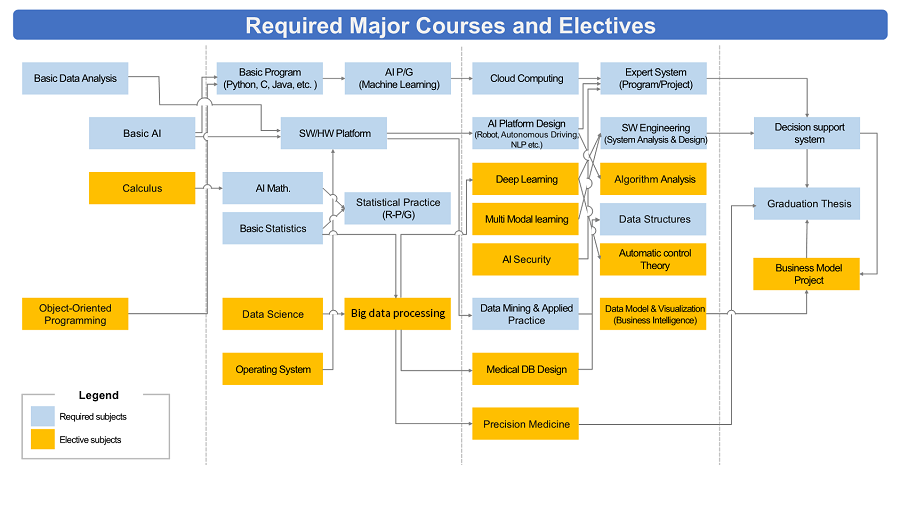"From Medical Big Data Processing to Future Artificial Intelligence"
Core Requirements

| Programming Basic | This course covers understanding the syntax and structure of programming languages, as well as honing the skills to write algorithms and debug code. It forms the foundation of computer science and software development, aiding in the improvement of programming abilities. |
|---|---|
| Basic Statistics | Topics covered include data collection, analysis, measures such as mean and variance, and probability. Students will gain a foundational understanding of data and the use of statistical methods to solve problems, enhancing their decision-making skills. |
| AI Mathematics | In this course, students will study mathematical concepts such as linear algebra, calculus, and statistics necessary to comprehend artificial intelligence and machine learning. Students will acquire the ability to use this mathematical knowledge to perform data analysis and modeling, building essential skills for understanding and developing machine learning and deep learning algorithms. |
| AI Programming | This program delves into topics such as machine learning, deep learning, natural language processing, and computer vision, providing students with the programming skills and fundamental principles required to develop artificial intelligence algorithms. It equips students with the capabilities needed to create various artificial intelligence applications. |
| SW/HW Platform Design | This course provides learning about the technology and principles of designing and developing integrated systems and platforms that combine software and hardware. It offers expertise in effectively integrating SW and HW, assisting in the successful construction of SW/HW platforms in various fields. |
| Practical Statistics | In this course, students will learn data collection, analysis, visualization, and report writing. It enhances their ability to apply statistics in practical work, making it a valuable subject for real-world applications. |
| AI Platform Design | This course covers the technology of designing software and systems based on artificial intelligence and machine learning. Students will learn AI model development, training, evaluation, and deployment, while developing the capability to construct and optimize AI platforms. These skills are used to design and implement AI solutions across various fields. |
| Data Mining and Practice | Students will learn data mining techniques for extracting hidden patterns and information from large datasets. It provides core skills for data analysis and prediction and allows students to apply data mining techniques in real-world environments through practical projects, enhancing their problem-solving abilities. |
| Medical Expert Systems | In the medical field, this course covers artificial intelligence and expert systems, focusing on improving medical decision-making. Students will analyze medical data and develop systems to support diagnosis, enhancing their ability to improve decision-making processes in the medical field. |
| Software Engineering | This course covers the software development lifecycle, requirements analysis, design, testing, project management, and more. It helps students develop effective software development and management skills, contributing to the success and quality improvement of software projects. |
| Decision Support Systems | This course covers technologies that improve the decision-making process and aid in decision-making. Students will learn data analysis, modeling, simulation, and the development of decision support tools. It equips them with the skills to enhance decision-making in various fields, including business, public policy, healthcare, and science, by acquiring technologies and tools used in decision-making. |
| Graduation Thesis | In this course, students select their research topic and go through stages such as literature review, data collection and analysis, result interpretation, discussion, and conclusion to write a thesis. It provides an opportunity to enhance research skills and apply academic knowledge, serving as a crucial requirement for graduation. |


